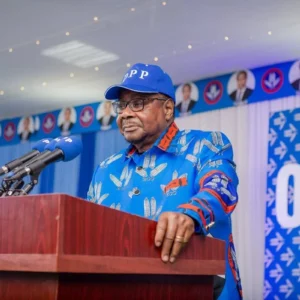Kampala, Uganda – The Buganda Road Magistrates Court in Kampala has issued an international arrest warrant for Isaac Kimaze Ssemakadde, the embattled President of the Uganda Law Society (ULS), escalating a legal saga that has gripped the nation’s legal and political spheres. Chief Magistrate Ronald Kayizzi ordered the International Police (Interpol) to apprehend Ssemakadde, whose current whereabouts remain unknown, following his repeated failure to appear in court to face charges of insulting the modesty of a woman.
The case originated from an incident on November 18, 2024, when Ssemakadde allegedly made derogatory and obscene remarks about Uganda’s Director of Public Prosecutions (DPP), Justice Jane Frances Abodo, during a symposium titled “The State of the Rule of Law, Constitutionalism, and Human Rights: The Kisumu 36 Tales.” Held at Katonga Road in Kampala and hosted by the People’s Freedom Front (PFF) party, the event saw Ssemakadde reportedly unleash a verbal tirade against Abodo, accusing her of professional misconduct. The remarks, which were widely circulated on social media, prompted outrage and led to a private prosecution initiated by lawyers Tonny Tumukunde and Joshua Byamazima in December 2024.
Tumukunde and Byamazima accused Ssemakadde of violating Section 115(3) of Uganda’s Penal Code Act, which criminalizes acts that insult the modesty of a woman. The lawyers submitted evidence, including a video recording of the symposium, to substantiate their claims. The court issued criminal summons for Ssemakadde to appear on January 29, 2025, but he failed to attend, citing a severe cough. His legal team argued that his presence was effectively represented through their attendance, a claim Chief Magistrate Kayizzi rejected, insisting that Ssemakadde must personally appear to enter a plea.
On February 10, 2025, the court declined to issue an arrest warrant, extending the summons to February 24, 2025, to give Ssemakadde another chance to appear. However, when he again failed to show up, Kayizzi issued a national arrest warrant, noting that no convincing reasons had been provided for his absence. The court’s patience ran out on March 19, 2025, when evidence suggested Ssemakadde had fled the country, prompting the escalation to an international arrest warrant.
The warrant, issued today, authorizes Interpol—a global police organization with 194 member countries—to locate and detain Ssemakadde wherever he may be. Interpol’s role will involve coordinating with law enforcement agencies worldwide to execute the arrest and facilitate his extradition back to Uganda. This type of warrant, often referred to as a “Red Notice” in Interpol’s system, is the closest instrument to an international arrest warrant in use today, though it does not guarantee extradition, as that depends on the laws and cooperation of the country where the suspect is found. Chief Magistrate Kayizzi granted the request for Interpol’s involvement after Tumukunde and Byamazima argued that Ssemakadde was evading justice and likely hiding outside Uganda’s borders. “The accused has shown a clear intent to disregard the judicial process,” Kayizzi stated in his ruling. “This court has no option but to seek international assistance to ensure he faces the charges leveled against him.”
Ssemakadde’s legal troubles extend beyond this case. On February 14, 2025, High Court Justice Musa Ssekaana sentenced him to two years in prison for contempt of court after Ssemakadde launched scathing social media attacks against the judge, criticizing a ruling that blocked a ULS meeting. That sentence, which Ssemakadde is also contesting, has fueled speculation that his current absence may be an attempt to avoid multiple legal battles converging simultaneously.
As the outspoken leader of the ULS and a self-proclaimed advocate for a “radical new bar,” Ssemakadde has been a polarizing figure, clashing with judicial authorities and government officials alike. His supporters argue that the charges against him are politically motivated, aimed at silencing his activism and reformist agenda within Uganda’s legal profession. Critics, however, contend that his inflammatory rhetoric has crossed legal and ethical lines, undermining the dignity of public institutions.
With the international arrest warrant now in effect, the focus shifts to Interpol’s ability to locate Ssemakadde and the willingness of foreign governments to cooperate with Uganda’s request. Legal experts note that if Ssemakadde is apprehended, his extradition could face challenges, particularly if he seeks asylum or contests the charges on political grounds. Meanwhile, the Buganda Road Court has scheduled the warrant’s return date for a future hearing, pending his capture.







